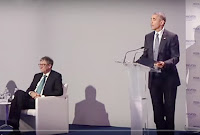The Obama administration celebrated the Breakthrough Energy Coalition at last year's Paris climate summit as evidence that some of the world's most successful financiers back the president's agenda of addressing warming.
But the pledge by Microsoft Corp. co-founder Bill Gates and others to channel resources toward revolutionary new energy technologies reopened a long-standing debate over whether billions in private-sector dollars should be spent chasing an "energy miracle" or helping market-ready technologies gain traction.
"I don't think it's an 'either-or' thing; I think it's an 'all' thing," U.S. Special Envoy for Climate Change Jonathan Pershing said of the innovation-versus-deployment conundrum in a recent interview with ClimateWire.
But some clean technology and climate change experts say it's dangerous to send a message that today's technologies aren't enough to help move the world in a less carbon-intensive direction. By chasing "breakthroughs," they say, Gates and the 27 other members of the investors coalition are encouraging governments and the private sector to reduce their investment in today's technologies, or even giving cover to those who would prefer to delay action. Those advocates find fault with the Department of Energy's emphasis on early-stage research and with Gates' association with some opponents of mandatory carbon-reduction policies.
...
"It doesn't really matter if some miracle emerges in the next two decades because CO2 emissions are cumulative," echoed Joe Romm, founding editor of Climate Progress.
Meanwhile, today's technologies are growing as a share of the world's total energy portfolio, and the scale-up is pushing prices down globally.
...
"The technologies that are going to do most of the emissions reductions are good old-fashioned solar, wind and energy storage," Romm predicted.
...
Since Gates stood next to Obama on that platform in Le Bourget airfield in November and introduced his coalition, Gates has substantially moderated his tone on current technologies. A paper explaining the coalition's mission released then touted their potential, especially if gains are made in energy storage, an area many renewable energy advocates wish to see BEC focus on. And he said in a blog post in June that he didn't see the coalition's quest for a breakthrough as a "zero-sum game."
...
Still searching for solutions
Romm, who led DOE's Office of Energy Efficiency and Renewable Energy during the 1990s, said the federal government should play a major role in energy deployment along with the kind of research and development Gates envisions.
"We're clearly not investing enough in R&D and deployment," he said. "To achieve the current unanimous goal of keeping warming below 2 degrees Centigrade, we have to across the board spend more money."
While he was at DOE, the department debated whether to invest in long-term projects that could have a massive environmental payoff or to support companies that could make a dent in the marketplace, and in the end, DOE set its sights on energy research whose payoffs were years away.
"If something looked like it needed 10 years, it looked like a place for the federal government," he said. In the years since, costs for wind and solar energy have plummeted, so the focus should now be getting renewables online and taking fossil energy off the grid.
"If I had Gates' money or if I were advising Gates, I would not say I'm going to devote all my money to the early-stage part of the process," he added. "Every part could use more money."
Read more at Does the World Really Need a Clean Energy 'Moonshot'?

No comments:
Post a Comment